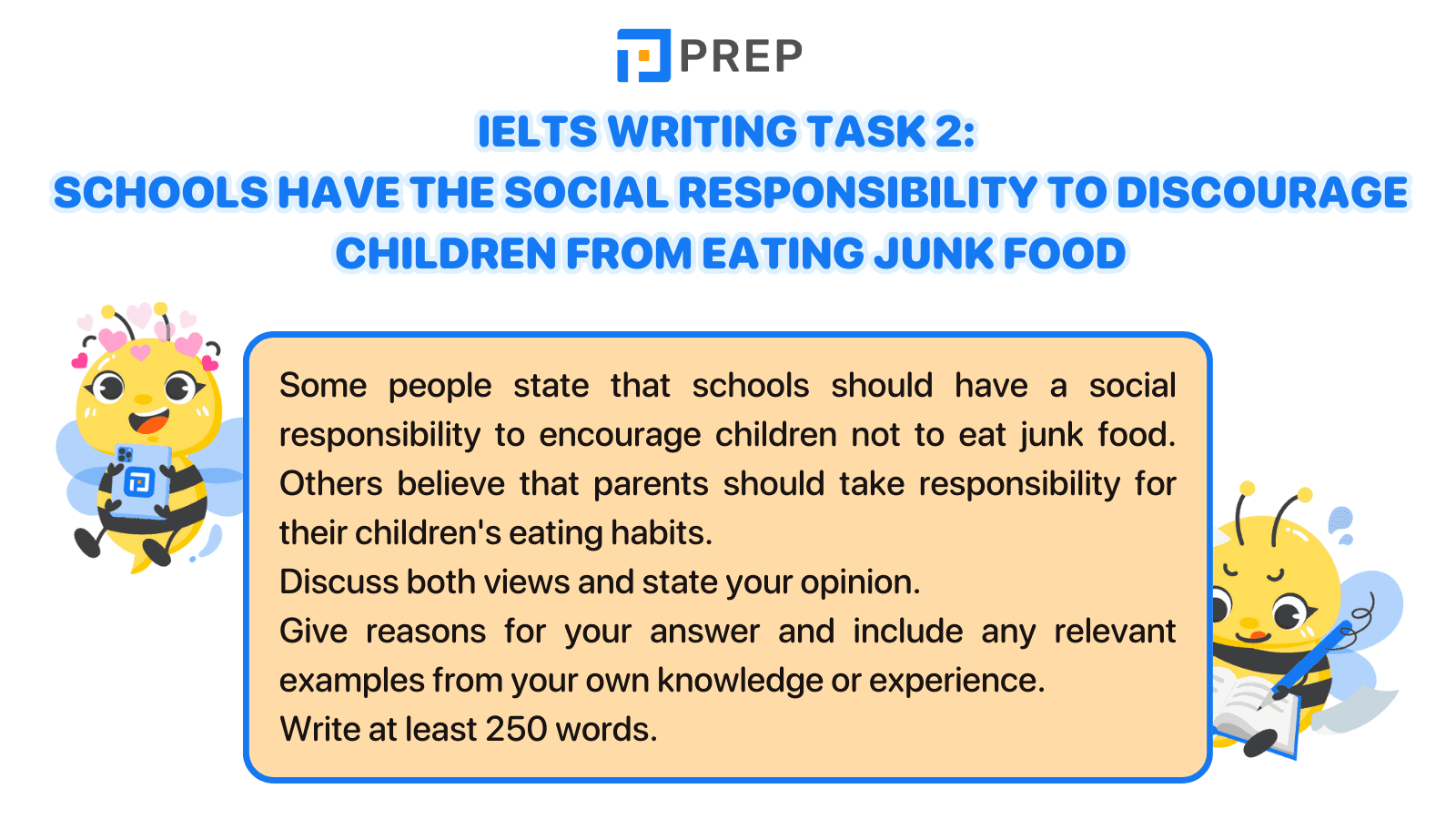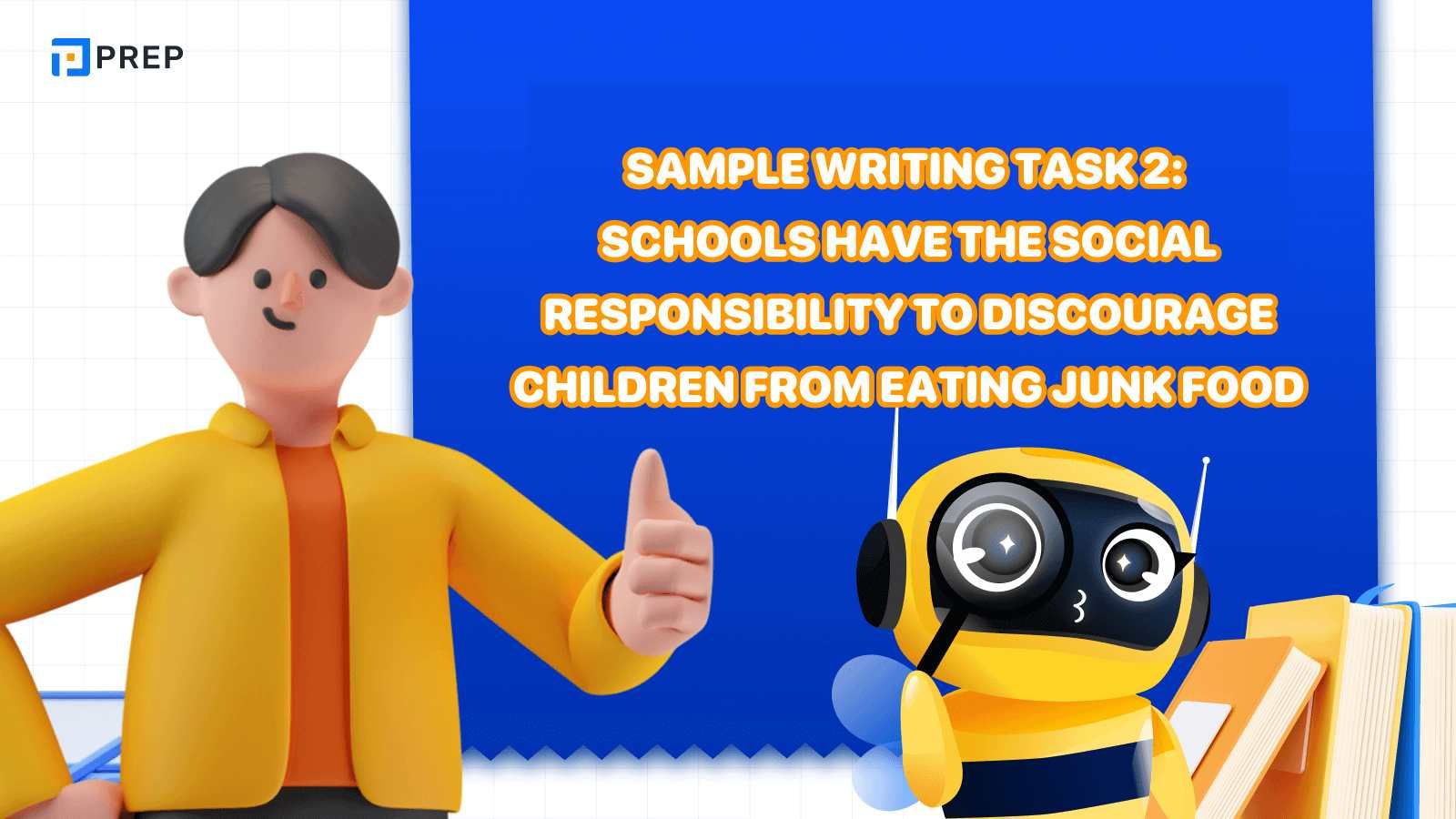Sample IELTS Writing Task 2 Schools have the social responsibility to discourage children from eating junk food
The IELTS Writing Task 2 Schools have the social responsibility to discourage children from eating junk food has appeared in the actual IELTS exam before. In today's article, PREP would like to share with you the essay prompt, the outline, and a high-quality sample essay (band 7.0+). Check it out right away!
*This sample was prepared by Mr. Nhat Pham, an IELTS 8.5 Overall achiever (9.0 Listening, 9.0 Reading, 8.0 Writing, 7.5 Speaking) and Marker Leader at PREP.

I. The task and outline for IELTS Writing Task 2 Schools have the social responsibility to discourage children from eating junk food
Let's explore the essay prompt and the detailed outline for the IELTS Writing Task 2 Schools have the social responsibility to discourage children from eating junk food with PREP!
1. Task
You should spend about 40 minutes on this task.
Write about the following topic:
Some people state that schools should have a social responsibility to encourage children not to eat junk food. Others believe that parents should take responsibility for their children's eating habits.
Discuss both views and state your opinion.
Give reasons for your answer and include any relevant examples from your own knowledge or experience.
Write at least 250 words.

2. Outline
Check out the detailed outline for IELTS Writing Task 2 Schools have the social responsibility to discourage children from eating junk food below!
|
Introduction |
|
|
Why schools should have a social responsibility to discouraging children from eating junk food |
|
|
Why parents should take responsibility for their children's eating habits |
|
|
Conclusion & Opinion |
|
II. Sample IELTS Writing Task 2 Schools have the social responsibility to discourage children from eating junk food

After thoroughly studying the essay prompt and the detailed outline, let's move on to checking out the high-quality sample essay for IELTS Writing Task 2 Schools have the social responsibility to discourage children from eating junk food with PREP!
Language learning in schools has been an ongoing discussion in society. On one side of the debate, people argue that educational institutions should not compel students to learn a foreign language, especially those who do not possess a natural proficiency. I agree with this sentiment, despite some claims that language learning should be compulsory at school.
On the one hand, a policy of mandatory language learning at school may be reasonable. Firstly, it can set schoolchildren up for success in the future. Specifically, proficiency in an additional language expands a child’s cognitive abilities, increasing their adaptability, creativity and problem-solving skills. It could, therefore, open many doors for them to improve their career prospects or develop intellectually. Secondly, a school which has implemented the aforementioned scheme can enhance its prestige. By dispensing a linguistically diverse curriculum, such a school can attract students from wealthy backgrounds, or allow itself to receive better funding. At the very least, it could offer additional languages as electives, which the learners could choose to do or opt out of pursuing.
There is an argument against mandatory language education in schools, however. Linguistic talent, just like an affinity for arts or sports, varies between individuals, so forcing a student who lacks this ability to study a foreign language would cause them to struggle academically. This burden may lead to a sense of failure and inferiority, thereby hampering their overall academic progress. Even more so, this could also diminish the interest of a child in learning, eventually leading to negative implications. In addition, having to provide foreign language lessons to many students who are neither talented nor interested in them is likely a waste of resources, straining public schools’ budgets. Unless the education sector receives more government funding, mandating such a policy at school will be difficult.
In conclusion, while acknowledging the various benefits of language learning, I disagree with compulsory foreign language education at school. Educational institutions ought not to impose, but rather encourage and facilitate language acquisition in a way that creates a voluntary, enjoyable and meaningful experience for all students.
Vocabulary used in the sample essay for IELTS Writing Task 2 Schools have the social responsibility to discourage children from eating junk food:
-
Obesity (n.): the condition of being extremely overweight
-
Urgent (adj.): requiring immediate action or attention
-
Spark sth (v.): to cause something to start or come into being
-
Vigorous (adj.): strong, energetic, and active
-
Assume a responsibility (v.): to take on a duty or obligation
-
Abstain from sth (v.): to intentionally not do or consume something
-
Collaborate (v.): to work jointly with others or together
-
Dietary habits (n.): the habitual decisions and behaviors people make regarding their food and drink consumption
-
Be incorporated into sth (v.): to be included as part of something
-
Conducive (adj.): favorable or beneficial for a particular purpose
-
Shape/model sth (v.): to form or fashion something
-
Wholesome (adj.): healthy and good for you
-
Nutritive (adj.): providing nourishment; rich in nutrients
-
Curtail sth (v.): to reduce the extent, duration, or scale of something
-
Concerted effort (n.): a coordinated and collective effort
-
Foundational (adj.): forming a base or foundation
-
Take sb grocery shopping (v.): to accompany someone and guide them while they shop for groceries
-
Preclude (v.): to prevent the occurrence of; make impossible
-
Reinforce sth (v.): to strengthen or support something
-
Compound (v.): to make something worse or more severe
Hopefully, the information above has provided you with a complete prompt, detailed outline, and a high-quality band 7.0+ sample IELTS Writing Task 2 Schools have the social responsibility to discourage children from eating junk food. Keep following PREP to get more helpful English knowledge updates!
PREP is the only platform offering a comprehensive Writing evaluation process powered by AI technology. The system automatically detects and corrects errors in vocabulary and grammar while identifying critical mistakes that could lower your exam score. Using an exclusive scoring system with 4 main criteria and 11 sub-criteria, it helps you pinpoint common errors, analyze them, and provides detailed solutions in an easy-to-follow interface.
In addition to identifying mistakes, the system highlights your strengths in vocabulary, grammar structures, and ideas, helping you enhance these in future exams. It also offers tailored suggestions to address weaker areas, allowing you to improve step by step and effectively boost your band score.
Download the PREP app now to study IELTS at home and experience a high-quality online preparation program designed to help you achieve your target scores.

Hi I'm Chloe, and I am currently serving as an Product Content Administrator at Prep Education. With over five years of experience in independent online IELTS study and exam preparation, I am confident in my ability to support learners in achieving their highest possible scores.
Comment
Premium content
View allPersonalized roadmap
Most read












